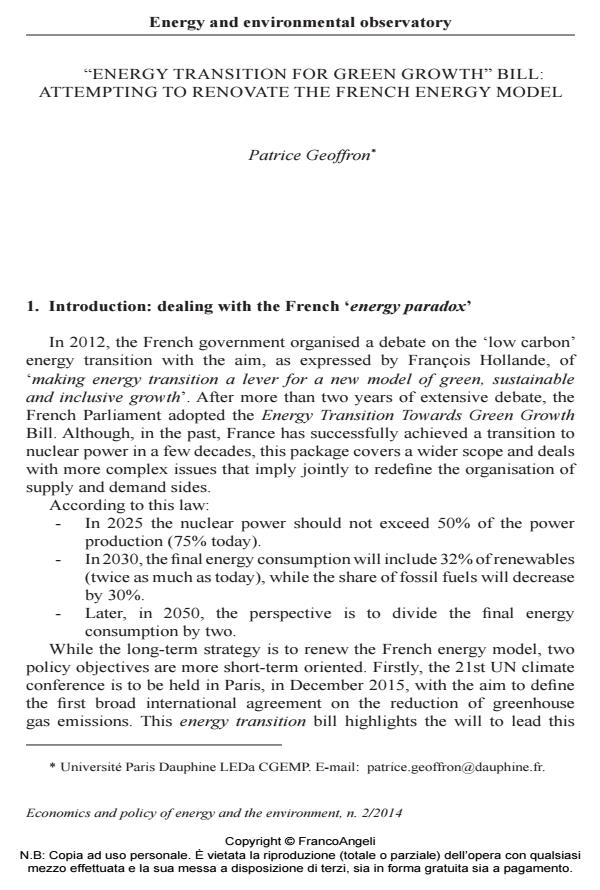"Energy transition for green growth" bill: attempting to renovate the French Energy model
Titolo Rivista ECONOMICS AND POLICY OF ENERGY AND THE ENVIRONMENT
Autori/Curatori Patrice Geoffron
Anno di pubblicazione 2015 Fascicolo 2014/2
Lingua Inglese Numero pagine 16 P. 5-20 Dimensione file 270 KB
DOI 10.3280/EFE2014-002001
Il DOI è il codice a barre della proprietà intellettuale: per saperne di più
clicca qui
Qui sotto puoi vedere in anteprima la prima pagina di questo articolo.
Se questo articolo ti interessa, lo puoi acquistare (e scaricare in formato pdf) seguendo le facili indicazioni per acquistare il download credit. Acquista Download Credits per scaricare questo Articolo in formato PDF

FrancoAngeli è membro della Publishers International Linking Association, Inc (PILA), associazione indipendente e non profit per facilitare (attraverso i servizi tecnologici implementati da CrossRef.org) l’accesso degli studiosi ai contenuti digitali nelle pubblicazioni professionali e scientifiche.
In 2015, the French Parliament passed a law that defines a strategy for energy transition after two years of open public debate. This legislative package outlines ambitious policy measures to reduce energy consumption and comprises an unprecedented effort to renovate homes and buildings. On the supply side, the Law aims for a diversification of energy sources with a phasing down of nuclear and the speeding up of renewable energy sources. Furthermore, by promoting a ‘circular’ economic model and positive-energy territories, it redefines the balance of power in favour of regional authorities, potentially leading to a turning point in French energy policy. But the Law also includes contradictions and grey areas. It is wishful thinking to believe in the phasing down of nuclear from 75% to 50% of the power production in 2025, combined with the stepping up of renewables to 40% of electricity consumption in 2030. And the current economic crisis puts a cap on the capacity of the State, as well as on local and regional authorities, to trigger the transition and, due to the same constraints, it is doubtful that households and corporations will be able to invest or bear the burden of higher energy prices. Finally, as with the German Energiewende, the French Law illustrates the European difficulties to define collectively a long-term energy strategy.
Parole chiave:French energy policy, energy transition, green economy
Jel codes:Q42, Q48, Q54
- 2025 14th International Conference on Renewable Energy Research and Applications (ICRERA) Umit Cetinkaya, Samet Ayik, Hafize Nurgul Durmus Senyapar, Mete Kagan Isikli, Ramazan Bayindir, pp.1995 (DOI:10.1109/ICRERA66237.2025.11283936)
Patrice Geoffron, "Energy transition for green growth" bill: attempting to renovate the French Energy model in "ECONOMICS AND POLICY OF ENERGY AND THE ENVIRONMENT" 2/2014, pp 5-20, DOI: 10.3280/EFE2014-002001